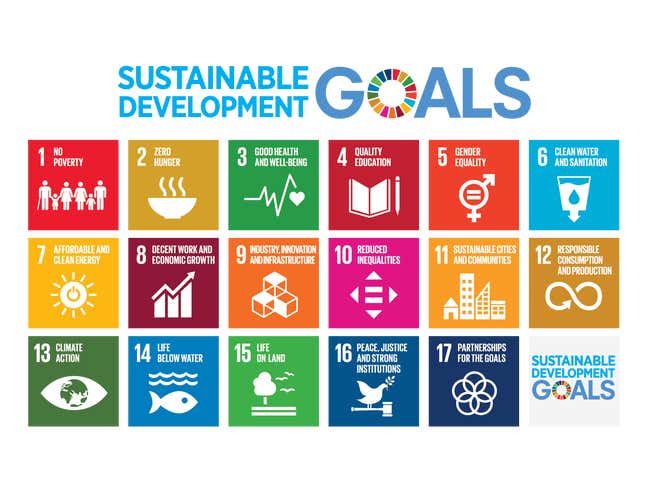This year marks the 10th anniversary of the global financial crisis, bringing with it an inescapable reminder of the power of the finance industry. While many tangible things have changed over the past decade—from stricter regulation to big banks’ leadership ranks—more subtle, yet no less consequential, shifts are also underway in the financial world. It may be hard to imagine, thinking back to the freewheeling pre-crisis days, but one legacy of the crisis could be a permanent shift in the finance industry’s moral compass.
Yes, really.
In this shift, 2015 was a pivotal year. The global adoption of the United Nations’ 17 Sustainable Development Goals (SDGs) and the Paris climate accord saw governments commit to ambitious environmental and sustainability targets. The private sector also has a role to play, especially the banking and asset management industries, given their part in financing projects and promoting good corporate governance as lenders and equity owners. The UN estimates that investments of $5-7 trillion are needed every year through 2030 to meet these goals.

Companies are adjusting their strategies to meet sustainability goals, out of a sense of social responsibility or the calculated financial conclusion that preparing for a low-carbon future or promoting gender equality will reap better returns. (Or both.) Banks have altered their policies on financing to fossil-fuel projects, such as deepwater oil drilling or tar sands oil extraction. There is also the development of gender-lens investing, with exchange-traded funds (ETFs) that invest in companies committed to gender equality, one of the UN’s development goals. In general, adherence to environmental, social, and governance criteria—known in the industry as ESG investing—is becoming more commonplace.
Just finance
Take, for example, the recent collaboration between Goldman Sachs and billionaire investor Paul Tudor Jones to create the “Just ETF.” It’s an index fund based on Jones’s rankings of big US companies according to good business practices. Just Capital, Jones’s foundation, polls people in America to find out what issues they think are important for company behavior, such as the treatment of workers, products that benefit the environment and society, or protecting personal privacy. Companies are then ranked against these issues. The top three highest scorers at the moment are Intel, Texas Instruments, and Nvidia.
The fund will track the large-cap Russell 1000 index, picking the top 50% of companies in each industry. Tudor said he believed the ETF, which launched about a month ago, has the potential to rival the S&P 500, the US’s benchmark stock index. This raises an important question: Will socially responsible investing ever just be “investing”?
Based on current trends, Pictet Asset Management forecasts that ESG assets will comprise around two-thirds of assets managed by global funds by 2020, up from half in 2016. But this is a broad filter that includes community investing, sustainability-themed investing, corporate engagement, and exclusionary screening. Take out exclusionary screening, in which funds divest from certain types of harmful companies—mostly commonly, weapons makers—then ESG’s share in 2020 falls to 31% of global assets, up from 24% in 2016. In short, explicitly sustainable and socially responsible investing is still far from mainstream.
Making an impact
As shown above, there are many strands of socially responsible investing. There’s ethical investing, which is guided by personal morals and might involve excluding weapons, tobacco, or gambling companies from portfolios; there’s SRI investing that focuses on how a company runs its business, not on its products; and there’s thematic investing, which screens for stocks that do work for environmental sustainability, for example.
A more advanced version of all of this is impact investing, in which a portfolio includes companies with stated social or environmental goals that can be measured. The fund assesses the intentions and commitment of companies to do good, and rewards them for meeting their goals with investment. The SDGs have become an integral part of impact investing, according to Sarah Norris, an investment manager at Aberdeen Standard Investments. Norris, who runs the firm’s global impact fund, said the SDGs create a “unifying language” for investors and companies. For now, “they really are the only road map that we have.”
The global impact fund at Aberdeen Standard is designed to invest in companies that are helping to achieve all 17 SDGs. This isn’t easy. It was launched in October and only has 40 companies in its portfolio as of May, with $8.8 million invested so far.
Norris has to meet what she describes as the “double bottom line,” showing both financial outperformance and impact outperformance to clients. The fund first screens for companies that are performing well financially and then selects from those the companies that demonstrate a long-term commitment to impact goals. Some goals are easier to satisfy than others. The easiest are companies committed to environmental sustainability and mitigating climate change. But companies that are both performing well and have explicitly committed to providing quality food, preventing land degradation, or increasing education and employment for marginalized people are harder to find.
Stay on target
In order to help investors navigate this fast-growing area of financial services, a raft of new services are cropping up, designed to assess whether portfolio companies are meeting impact measures and track whether funds are investing against their stated goals, particularly on environmental issues. This is necessary to avoid what Norris calls “impact washing,” or the pretense of meeting targets without ensuring that a company or fund is sustainable and ethical to its core.
Sustainalytics is a research company that has spent the past 25 years evaluating the environmental, social, and governance performance of listed companies. In other words, it started this well before ESG was fashionable. In May, for the first time, it began scoring companies on their exposure to fossil fuels and how at risk they are from a global transition to a low-carbon economy. While change happens slowly in the investment world, the talk about ESG and SDGs is “monumental,” said Diederik Timmer of Sustainalytics.
Using Sustainalytics’ company assessments, Morningstar, an investment research company, has launched a product that scores thousands of funds based on their carbon risk. Earlier this year, S&P Global Ratings formed a sustainable finance team dedicated to analyzing the ESG criteria of companies and countries. However, there is no international standard for measuring the validity of ESG investments, unlike the global accounting principles for companies.
Short-term thinking
There is still a major hurdle to overcome before sustainable investing becomes just what we call investing: performance. Fund managers and investors often repeat that the biggest barrier they face is proving that sustainable investments don’t come at the expense of good returns.
Swiss banking giant UBS has been trying to steer some of the private wealth it manages into investments that meet the SDGs. The bank highlights a 2015 paper which compiled the findings of 2,200 studies on ESG investing since the 1970s. It found that in 90% of the studies, ESG investing showed no negative performance versus the traditional approach, and many of the studies showed a positive performance that was stable over time. “The results show that the business case for ESG investing is empirically very well-founded,” the paper said.
Even so, old habits die hard. One change that could address a fundamental concern about financial performance is an end to short-termism in the finance industry. The constant pressure for funds and companies to meet or beat benchmarks every quarter can stand in the way of sustainable investments, which often require longer time horizons to realize their gains, both in terms of returns and global development goals.
“The fundamental issue of financing the SDGs remains unresolved,” Liu Zhenmin, the UN’s under-secretary-general for economic and social affairs, wrote in a recent column. “And, with the financial sector strongly oriented toward short-termism, the necessary investments may never materialize.”
Enter Warren Buffett and Jamie Dimon. The legendary investor and boss of America’s biggest bank have called on companies to stop issues quarterly earnings guidance, so they can have more flexibility in meeting longer-term goals without getting distracted by the short-term pressures that can discourage more forward-looking investments. This change in mindset could remove one of the biggest hurdles to financing global development goals, so if heavy hitters like Buffett and Dimon are on board, it may encourage a wave of money to flow to investments once considered niche but that are increasingly moving into the mainstream.
